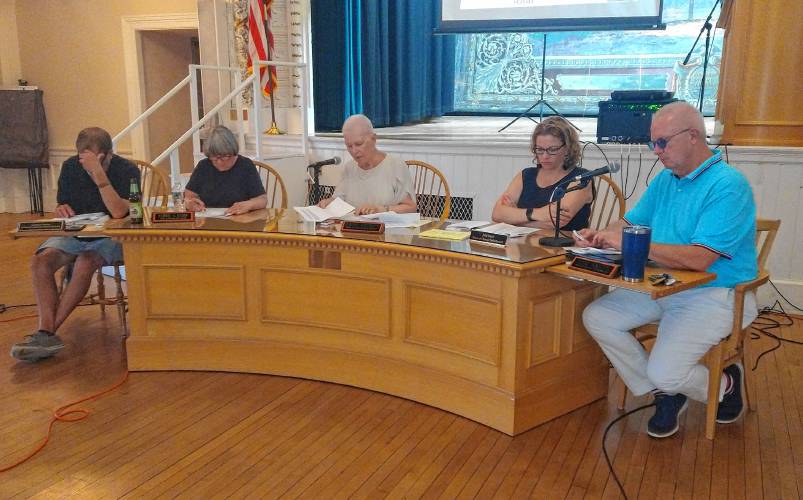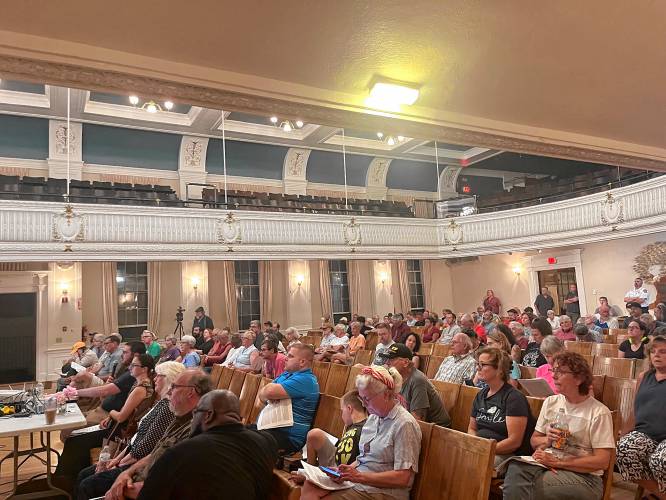$1M for water tower approved, audit voted down at Orange Town Meeting
|
Published: 06-19-2024 6:07 PM
Modified: 06-19-2024 8:29 PM |
ORANGE — Annual Town Meeting adjourned late Tuesday night after lengthy discussion on the remaining 30 articles that were carried over from Monday, including a $1 million request for a water tower and fire suppression system at the industrial park and citizen’s petition seeking $10,000 for a forensic audit of Orange’s financial processes.
Tuesday’s meeting at Town Hall picked up at Article 12, as the first 11 Town Meeting articles were voted on during Monday’s session, along with the preceding Special Town Meeting’s 45 articles.
Article 26, relating to the water tower and fire suppression system at the Orange Industrial Park, prompted heated discussion for a little over an hour. The $1 million from the town would be combined with a MassWorks grant of the same amount and $835,700 in American Rescue Plan Act (ARPA) funding. Although the Finance Committee voted 3 to 2 against the article, it passed on the Town Meeting floor by the required two-thirds majority.
Residents raised concerns about the cost of the project, along with maintenance costs. A motion to pass over the article until further information could be presented in a separate meeting failed.
Lee Chauvette, corporate human resources director with Seaman Paper, explained the company, located in the industrial park, has struggled with insurance costs due to the lack of water flow into its building, prompting concerns about fire suppression.
“I want to make sure that this doesn’t become Seaman Paper versus the town of Orange, because that’s not what it is,” Chauvette said.
He noted that Seaman Paper has agreed to handle maintenance of the fire suppression system.
“I’m authorized to tell you tonight that Seaman Paper will commit $250,000 to go toward this project,” he said.
Article continues after...
Yesterday's Most Read Articles
The company has already spent more than $450,000 to improve the sprinkler systems in its buildings at the request of the insurance company, with Seaman Paper demonstrating its commitment to staying in Orange, he said.
Residents voiced concern over spending such a large sum, particularly to benefit a private business.
“I personally do not want to see my grandchildren take on debt for a private company,” said resident Rhonda Barnett.
Selectboard member Jane Peirce noted, “The water supply will, yes, benefit Seaman Paper, but it will also benefit the other tenants in the industrial park, and be an incentive for any other business who might want to come and relocate in the industrial park.”
Another article that drew significant discussion was the citizen’s petition in Article 30, seeking to authorize $10,000 for a forensic audit of Orange’s financial processes, that was brought by Tim Sakach. The article failed, along with a proposed amendment to increase the amount to $36,000. The proposal comes in the wake of Orange having paid $338,000 in fraudulent invoices last year.
The Finance Committee did not support the petition, and attendees were left with questions as to an appropriate dollar amount. A full forensic audit could cost thousands of dollars more than the original amount proposed, as well as the amended number.
Town Accountant Amber Dupell noted that the state of Massachusetts offers free audits for towns upon request, and would be willing to meet with the petitioners to discuss audit options in the future.
Article 17, outlining performance standards for short-term rentals to be added to the zoning bylaws, passed with a majority vote. The bylaw change gives guidance to property owners who wish to run or are running short-term rental operations like Airbnb.
Some concerns were raised about the effects of short-term rentals in regards to the housing crisis. Community Development Director Walker Powell said that, given the tourism levels to Orange and demand for short-term rentals in the area, any impact on housing by these rentals would be “not as big an issue in Orange.”
Other major articles at Town Meeting included a $1.5 million water pumping system replacement project that was approved. Article 28, seeking to transfer $169,000 from free cash to offset half of the receivables created by payment of the fraudulent invoices, failed by a vote of 15 to 86.
Tuesday’s meeting began at 7 p.m. and adjourned at 10:33 p.m.
During the first night of Town Meeting, residents adopted a $27.4 million budget for fiscal year 2025. That is $238,706, or 0.9%, higher than the current fiscal year.
The proposed budget included $335,000 for the libraries. Town Administrator Matthew Fortier previously said this figure — down nearly $44,000 from what the libraries were allocated in the current fiscal year — was the result of a May 21 library trustees meeting that he attended with Selectboard Chair Tom Smith and Selectboard member Julie Davis. He also said this number is the lowest the libraries’ leadership believes it can work with.
The budget Fortier initially proposed included no funds for the library. This was an attempt to compensate for the $338,000 paid in fraudulent invoices last summer.
Resident Ann Reed proposed an amendment, which ultimately failed, to double the budget for tree warden expenses to $20,000 a year, restoring the 50% that had been proposed to be cut. She said this would allow the tree warden, Larry Delaney, more time and resources to remove trees and tree limbs that pose a danger to structures and roadways. Reed mentioned the 75-year-old man who was killed in nearby New Salem last year when a falling tree hit the vehicle he was driving.
But resident Marilyn Elwood took to the microphone to say she felt the increase was unnecessary. She said her utility company was willing to remove some worrisome trees she pointed out and she believes other companies would be happy to do the same.
Selectboard members explained the salary of Mikael Pyrtel, the economic development director hired in July, was not included in the proposed budget because it is being covered by the Economic Development and Industrial Corporation. They explained residents will still receive Pyrtel’s services and talent, but at a fraction of the cost.
Voters approved $8.65 million for Orange Elementary Schools, $5.24 million for its Ralph C. Mahar Regional School assessment and $626,316.17 for its Franklin County Technical School assessment. Fisher Hill Elementary School first grade teacher Christine Mullen had proposed increasing the OES figures to nearly $8.88 million but the amendment failed. Reed stood up and asked the schools to make do with what was proposed.
Stephanie Conrod, former Orange Elementary School Committee chair, urged her fellow citizens to support the school system, telling them it’s an investment in the future of the young people who will one day sit in the very chairs the adults were occupying at Annual Town Meeting. While resident William Johnson said he doesn’t like the idea of cuts to education funding and mentioned the mere suggestion is demoralizing to students, Ryan Belliveau said he is sick of people using student safety as an excuse to justify inflation and increase taxes.
Prior to Annual Town Meeting, 45 articles were adopted at a Special Town Meeting on Monday. Most of these articles pertained to the paving of North Main Street, following an underground water and wastewater upgrade that was completed last year. And most of those articles involved authorizing the acquisition of property easements to make the repaving possible.
Fortier had previously explained the Franklin Regional Transit Authority (FRTA) has earmarked $13 million for Orange for this project. He said the project will consist of tearing up and repaving the asphalt. This, he said, will allow for handicap accessibility to the nearby Fisher Hill Elementary School. It will also include the installation of new retaining walls, a new retention pond and a catch basin.
The Special Town Meeting started at 7 p.m. and ended 55 minutes later.








 ‘It’s a Wonderful Night in Turners Falls’ showcases village businesses, nonprofits
‘It’s a Wonderful Night in Turners Falls’ showcases village businesses, nonprofits Sackrey Construction Co. of Sunderland celebrating 35 years in business
Sackrey Construction Co. of Sunderland celebrating 35 years in business Photo: As darkness falls
Photo: As darkness falls Leverett residents rap Kittredge compound plans, urge caution as negotiations for 400 homes move forward
Leverett residents rap Kittredge compound plans, urge caution as negotiations for 400 homes move forward 
